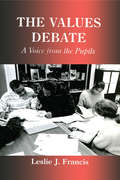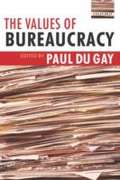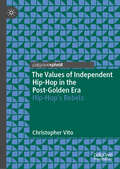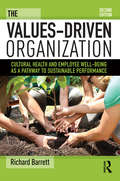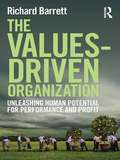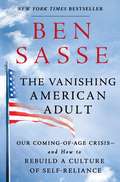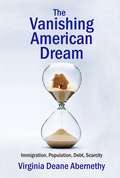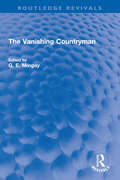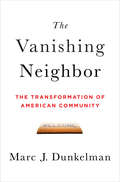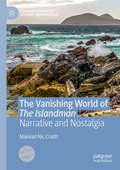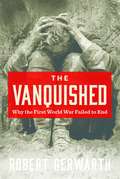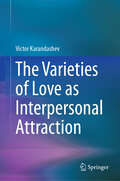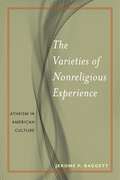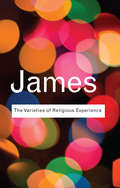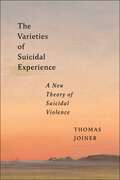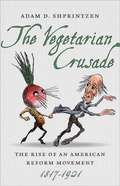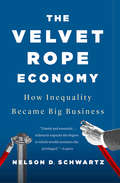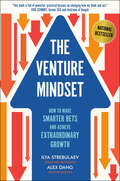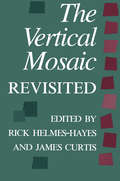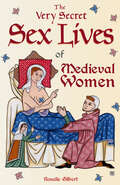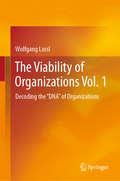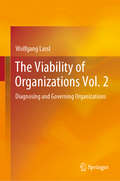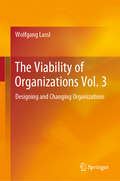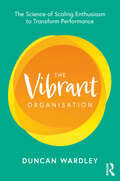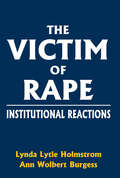- Table View
- List View
The Values Debate: A Voice from the Pupils (Woburn Education Series)
by Leslie J. FrancisPresents findings from a survey conducted among 30,000 13-15 year olds throughout England and Wales, giving particular attention to social, personal and moral issues.
The Values of Bureaucracy
by Paul Du GayFrom the introduction: "The demise of bureaucracy has been anticipated, and demanded, many times throughout the history of management thought, as well as in modern social and political theory. However, despite the scorn regularly heaped upon it, bureaucracy, both as an organizational ideal and as a diversely formatted organizational device, has proven remarkably resilient. Reports of its death have turned out to be somewhat premature. Despite the dramatic claims of certain prominent contemporary management gurus and social theorists that the end of the bureau is once again nigh (Castells 2000; Giddens 1998; Heckscher and Donnellon 1994; Leadbeater 1999; Peters 1989), there remain plenty of reasons to be cautious."
The Values of Independent Hip-Hop in the Post-Golden Era: Hip-Hop’s Rebels
by Christopher VitoUtilizing a mixed-methods approach, this book uncovers the historical trajectory of U.S. independent hip-hop in the post-golden era, seeking to understand its complex relationship to mainstream hip-hop culture and U.S. culture more generally. Christopher Vito analyzes the lyrics of indie hip-hop albums from 2000-2013 to uncover the dominant ideologies of independent artists regarding race, class, gender, sexual orientation, and social change. These analyses inform interviews with members of the indie hip-hop community to explore the meanings that they associate with the culture today, how technological and media changes impact the boundaries between independent and major, and whether and how this shapes their engagement with oppositional consciousness. Ultimately, this book aims to understand the complex and contradictory cultural politics of independent hip-hop in the contemporary age.
The Values-Driven Organization: Cultural Health and Employee Well-Being as a Pathway to Sustainable Performance
by Richard BarrettValues-driven organizations are the most successful organizations on the planet. This book explains that understanding employees’ needs—what people value—is the key to creating a high performing organization. When you support employees in satisfying their needs, they respond with high levels of engagement and willingly commit their energies to the organization, bringing passion and creativity to their work. This new edition of The Values-Driven Organization provides an updated set of tools to assess corporate culture, new case studies on cultural transformation and additional materials on sustainability, measuring cultural health at work and the specific needs of the millennial generation. The Values-Driven Organization is essential reading for students, researchers and practitioners of organizational change, leadership, HRM and business ethics.
The Values-Driven Organization: Unleashing Human Potential for Performance and Profit
by Richard BarrettBased on significant new research from multiple sources, Richard Barrett creates a compelling narrative about why values-driven organizations are the most successful organizations on the planet. According to Barrett, understanding employee's needs--what people value--is the key to creating a high performing organization. When you support employees in satisfying their needs, they respond with high levels of employee engagement and willingly bring their commitment and creativity to their work. This book updates and brings together in one volume, two of Richard Barrett's previous publications, Liberating the Corporate Soul (1998) and Building a Values-Driven Organisation (2006), to provide a reference manual for leaders and change agents who wish to create a values-driven organization. The text provides both a leadership approach, and a language, for organizational transformation and culture change that incorporates concepts such as cultural entropy, values alignment and whole system change. With an updated set of cultural diagnostic tools and a wide range of new and exciting case studies on culture and leadership development, The Values-Driven Organization will be essential reading for students, researchers and practitioners in the fields of organizational change, leadership and ethics.
The Vanishing American Adult: Our Coming-of-Age Crisis--and How to Rebuild a Culture of Self-Reliance
by Ben Sasse<P>In an era of safe spaces, trigger warnings, and an unprecedented election, the country's youth are in crisis. Senator Ben Sasse warns the nation about the existential threat to America's future. <P>Raised by well-meaning but overprotective parents and coddled by well-meaning but misbegotten government programs, America's youth are ill-equipped to survive in our highly-competitive global economy. Many of the coming-of-age rituals that have defined the American experience since the Founding: learning the value of working with your hands, leaving home to start a family, becoming economically self-reliant—are being delayed or skipped altogether. <P>The statistics are daunting: 30% of college students drop out after the first year, and only 4 in 10 graduate. One in three 18-to-34 year-olds live with their parents. From these disparate phenomena: Nebraska Senator Ben Sasse who as president of a Midwestern college observed the trials of this generation up close, sees an existential threat to the American way of life. <P>In The Vanishing American Adult, Sasse diagnoses the causes of a generation that can't grow up and offers a path for raising children to become active and engaged citizens. He identifies core formative experiences that all young people should pursue: hard work to appreciate the benefits of labor, travel to understand deprivation and want, the power of reading, the importance of nurturing your body—and explains how parents can encourage them. <P>Our democracy depends on responsible, contributing adults to function properly—without them America falls prey to populist demagogues. A call to arms, The Vanishing American Adult will ignite a much-needed debate about the link between the way we're raising our children and the future of our country. <P><b>A New York Times Bestseller</b>
The Vanishing American Dream: Immigration, Population, Debt, Scarcity
by Virginia Deane AbernethyThe United States has gone off track, allowing domestic and foreign aid policies to be co-opted by a government—abetted by mass media—that serves special interests rather than the greater national good. Americans' tendencies to trust, play fair, and help have been abused and require replacement by a realistic outlook.The Vanishing American Dream posits solutions to get America back on the right track. Abernethy sees population growth driven by mass immigration as a major cause of economic and cultural changes that have been detrimental to most Americans. The environment has been degraded by over-crowding and increasing demands on natural resources. Work is cheapened by explosive growth in the labour force creating a buyer's market. One salary or wage no longer supports a family and educates children. Women working outside the home is a necessity, not a choice, for most American families. Furthermore, feminism, aimed originally at balanced gender roles, has been turned viciously against males of all ages and ultimately against females through degrading their traditional and valuable contributions.Abernethy proposes that Americans need time to regroup, untroubled by a continuing influx of foreign peoples. The family, small business, and responsive local government are centres around which a solvent and confident citizenry can prosper again.
The Vanishing Countryman (Routledge Revivals)
by G. E. MingayFirst published in 1989, The Vanishing Countryman investigates how farmers, farm workers, and other country crafts- and tradespeople have fared in response to significant changes across the British countryside in the past one hundred years. The book explores the move towards large-scale and capital-intensive farming, and the conflict between increased production and damage to the environment. It looks at the decline in the number of farm workers, crafts- and tradespeople. It also considers the changes in social composition across country villages and the impact that this has had on living standards, housing, and transport. The Vanishing Countryman will appeal to those with an interest in rural and social history, and in the history of the British countryside specifically.
The Vanishing Neighbor: The Transformation of American Community
by Marc J. DunkelmanA sweeping new look at the unheralded transformation that is eroding the foundations of American exceptionalism. Americans today find themselves mired in an era of uncertainty and frustration. The nation's safety net is pulling apart under its own weight; political compromise is viewed as a form of defeat; and our faith in the enduring concept of American exceptionalism appears increasingly outdated. But the American Age may not be ending. In The Vanishing Neighbor, Marc J. Dunkelman identifies an epochal shift in the structure of American life--a shift unnoticed by many. Routines that once put doctors and lawyers in touch with grocers and plumbers--interactions that encouraged debate and cultivated compromise--have changed dramatically since the postwar era. Both technology and the new routines of everyday life connect tight-knit circles and expand the breadth of our social landscapes, but they've sapped the commonplace, incidental interactions that for centuries have built local communities and fostered healthy debate. The disappearance of these once-central relationships--between people who are familiar but not close, or friendly but not intimate--lies at the root of America's economic woes and political gridlock. The institutions that were erected to support what Tocqueville called the "township"--that unique locus of the power of citizens--are failing because they haven't yet been molded to the realities of the new American community. It's time we moved beyond the debate over whether the changes being made to American life are good or bad and focus instead on understanding the tradeoffs. Our cities are less racially segregated than in decades past, but we've become less cognizant of what's happening in the lives of people from different economic backgrounds, education levels, or age groups. Familiar divisions have been replaced by cross-cutting networks--with profound effects for the way we resolve conflicts, spur innovation, and care for those in need. The good news is that the very transformation at the heart of our current anxiety holds the promise of more hope and prosperity than would have been possible under the old order. The Vanishing Neighbor argues persuasively that to win the future we need to adapt yesterday's institutions to the realities of the twenty-first-century American community.
The Vanishing World of The Islandman: Narrative and Nostalgia (Palgrave Studies in Literary Anthropology)
by Máiréad Nic CraithExploring An t-Oileánach (anglicised as The Islandman), an indigenous Irish-language memoir written by Tomás Ó Criomhthain (Tomás O'Crohan), Máiréad Nic Craith charts the development of Ó Criomhthain as an author; the writing, illustration, and publication of the memoir in Irish; and the reaction to its portrayal of an authentic, Gaelic lifestyle in Ireland. As she probes the appeal of an island fisherman’s century-old life-story to readers in several languages—considering the memoir’s global reception in human, literary and artistic terms—Nic Craith uncovers the indelible marks of Ó Criomhthain’s writing closer to home: the Blasket Island Interpretive Centre, which seeks to institutionalize the experience evoked by the memoir, and a widespread writerly habit amongst the diasporic population of the Island. Through the overlapping frames of literary analysis, archival work, interviews, and ethnographic examination, nostalgia emerges and re-emerges as a central theme, expressed in different ways by the young Irish state, by Irish-American descendants of Blasket Islanders in the US today, by anthropologists, and beyond.
The Vanquished: Why the First World War Failed to End
by Robert GerwarthAn epic, groundbreaking account of the ethnic and state violence that followed the end of World War I―conflicts that would shape the course of the twentieth century For the Western Allies, November 11, 1918, has always been a solemn date―the end of fighting that had destroyed a generation, but also a vindication of a terrible sacrifice with the total collapse of the principal enemies: the German Empire, Austria-Hungary, and the Ottoman Empire. But for much of the rest of Europe this was a day with no meaning, as a continuing, nightmarish series of conflicts engulfed country after country. In The Vanquished, a highly original and gripping work of history, Robert Gerwarth asks us to think again about the true legacy of the First World War. In large part it was not the fighting on the Western Front that proved so ruinous to Europe’s future, but the devastating aftermath, as countries on both sides of the original conflict were savaged by revolutions, pogroms, mass expulsions, and further major military clashes. In the years immediately after the armistice, millions would die across central, eastern, and southeastern Europe before the Soviet Union and a series of rickety and exhausted small new states would come into being. It was here, in the ruins of Europe, that extreme ideologies such as fascism would take shape and ultimately emerge triumphant. As absorbing in its drama as it is unsettling in its analysis, The Vanquished is destined to transform our understanding of not just the First World War but the twentieth century as a whole.
The Varieties of Love as Interpersonal Attraction
by Victor KarandashevJoining other publications on love by this author, the current volume examines the great varieties of love as interpersonal attraction. Drawing on classical and recent studies from global perspectives, it explores the components, dimensions, and contexts of interpersonal attraction. Its comprehensive coverage includes biological, physical, psychological, social, and cultural perspectives to give a full scientific picture of love as attraction in animals and humans. This book is relevant to professionals and researchers who seek an in-depth knowledge of love and interpersonal attraction, the key aspects of studies in a range of scientific areas.
The Varieties of Nonreligious Experience: Atheism in American Culture (Secular Studies #2)
by Jerome P BaggettA fascinating exploration of the breadth of social, emotional, and spiritual experiences of atheists in America Self-identified atheists make up roughly 5 percent of the American religious landscape, comprising a larger population than Jehovah’s Witnesses, Orthodox Christians, Muslims, Buddhists, and Hindus combined. In spite of their relatively significant presence in society, atheists are one of the most stigmatized groups in the United States, frequently portrayed as immoral, unhappy, or even outright angry. Yet we know very little about what their lives are actually like as they live among their largely religious, and sometimes hostile, fellow citizens. In this book, Jerome P. Baggett listens to what atheists have to say about their own lives and viewpoints. Drawing on questionnaires and interviews with more than five hundred American atheists scattered across the country, The Varieties of Nonreligious Experience uncovers what they think about morality, what gives meaning to their lives, how they feel about religious people, and what they think and know about religion itself. Though the wider public routinely understands atheists in negative terms, as people who do not believe in God, Baggett pushes readers to view them in a different light. Rather than simply rejecting God and religion, atheists actually embrace something much more substantive—lives marked by greater integrity, open-mindedness, and progress.Beyond just talking about or to American atheists, the time is overdue to let them speak for themselves. This book is a must-read for anyone interested in joining the conversation.
The Varieties of Religious Experience: A Study In Human Nature (Routledge Classics)
by William James'Is life worth living? Yes, a thousand times yes when the world still holds such spirits as Professor James.' - Gertrude Stein A classic of American thought, William James’ The Varieties of Religious Experience is an extraordinary study of human spirituality in all its forms and one of the most profound works of Psychology ever written. When the book was published in 1902 the study of the human mind was a thrillingly new field of scientific enquiry: James was one of the first to seriously examine the psychology of religious faith and where he led, both Jung and Freud would follow. Yet for all its historical significance, this is a book full of humanity, wit and some deeply personal stories of revelation, religious devotion and mystical experience. The Routledge Classics edition of The Varieties of Religious Experience makes available in paperback for the first time the Centenary Edition published by Routledge in 2002 with new introductions on the historical and contemporary significance of James’ work and a foreword by the author’s grandson, Micky James.
The Varieties of Suicidal Experience: A New Theory of Suicidal Violence (Psychology and Crime)
by Thomas JoinerPROSE Award Finalist for Psychology and Applied Social WorkArgues that a range of behaviors such as murder-suicide, terrorism, and mass shootings are better understood as motivated by suicidal impulses than by homicidal onesMass shooters often display behaviors that strongly mirror the warning signs for suicide: lives led in isolation, intense personal suffering, disaffection, and struggle. Letters detailing why they did what they did paint pictures of intense misery and loneliness. As this book makes clear, private despair sometimes leads to social violence.In this groundbreaking work, Thomas Joiner offers a unified theory of suicide, making the case that many acts that appear homicidal are best understood primarily as suicidal. We must recognize that there are several forms of suicidal violence, some of which masquerade as other types of acts, including terrorism and murder. These include suicide-by-cop, suicide terrorism, murder-suicide, and running amok. Though there are obvious differences among these acts, Joiner argues that framing them as stemming from a common ideology of suicide is a crucial step in preventing these atrocities.By recognizing the desire to die—not to kill—as being at the heart of many of the acts of those who choose to kill their partner, shoot up their school, or terrorize their community, we can offer more effective measures of intervention. At a time when our nation is scrambling for solutions in the fight to end gun violence, this book presents a crucial component in the detection and treatment of unwell individuals.
The Vegetarian Crusade
by Adam D. ShprintzenVegetarianism has been practiced in the United States since the country's founding, yet the early years of the movement have been woefully misunderstood and understudied. Through the Civil War, the vegetarian movement focused on social and political reform, but by the late nineteenth century, the movement became a path for personal strength and success in a newly individualistic, consumption-driven economy. This development led to greater expansion and acceptance of vegetarianism in mainstream society. So argues Adam D. Shprintzen in his lively history of early American vegetarianism and social reform. From Bible Christians to Grahamites, the American Vegetarian Society to the Battle Creek Sanitarium, Shprintzen explores the diverse proponents of reform-motivated vegetarianism and explains how each of these groups used diet as a response to changing social and political conditions. By examining the advocates of vegetarianism, including institutions, organizations, activists, and publications, Shprintzen explores how an idea grew into a nationwide community united not only by diet but also by broader goals of social reform.
The Velvet Rope Economy: How Inequality Became Big Business
by Nelson D. SchwartzFrom New York Times business reporter Nelson D. Schwartz comes a gripping investigation of how a virtual velvet rope divides Americans in every arena of life, creating a friction-free existence for those with money on one side and a Darwinian struggle for the middle class on the other side.In nearly every realm of daily life--from health care to education, highways to home security--there is an invisible velvet rope that divides how Americans live. On one side of the rope, for a price, red tape is cut, lines are jumped, appointments are secured, and doors are opened. On the other side, middle- and working-class Americans fight to find an empty seat on the plane, a place in line with their kids at the amusement park, a college acceptance, or a hospital bed. We are all aware of the gap between the rich and everyone else, but when we weren't looking, business innovators stepped in to exploit it, shifting services away from the masses and finding new ways to profit by serving the privileged. And as decision-makers and corporate leaders increasingly live on the friction-free side of the velvet rope, they are less inclined to change--or even notice--the obstacles everyone else must contend with. Schwartz's "must read" book takes us on a behind-the-scenes tour of this new reality and shows the toll the velvet rope divide takes on society.
The Venture Mindset: How to Make Smarter Bets and Achieve Extraordinary Growth
by Ilya Strebulaev Alex DangA NATIONAL BESTSELLER & FINANCIAL TIMES BUSINESS BOOK OF THE MONTH"Full of powerful, practical lessons on changing how we think and act." –Eric Schmidt, former CEO and Chairman of Google "A must-read for board members, executives, and investors.&” – Amy Bance, investor and Fortune 500 Board Member The Venture Mindset is a playbook on how to adapt to a rapidly changing world, make smarter bets, launch new ventures, and transform traditional organizations into hubs for innovation, from a top Stanford professor and a technology executive. Venture capitalists are known for their extraordinary ability to spot opportunities. They know how to identify emerging trends, how to bring new industries into being, and when to hold them and when to fold. Their unique mindset has made them the force behind world-changing companies such as Amazon, Google, Moderna, SpaceX, and Zoom. Stanford Professor Ilya Strebulaev has devoted two decades to studying VCs&’ counterintuitive approaches to decision-making and the reasons behind the successes and failures of corporate innovations. Alex Dang has witnessed up close how VCs&’ thinking and mechanisms can create successful businesses at companies like Amazon and McKinsey. Combining their insight and extensive experience, they present nine distinct principles that will help you make better decisions, transform your business, and achieve remarkable results, no matter your industry. In The Venture Mindset, you&’ll learn: • One question VCs ask that will change the way you evaluate opportunities • Why you should encourage dissent and be wary of consensus • The number one killer of innovation in traditional corporate environments • Why it&’s crucial to learn when to &‘pull the plug&’ on initiatives • Why failure is not just an option, but a necessity Packed with entertaining stories and scientific precision, The Venture Mindset is a must-read for anyone who wants to be better equipped for the era of uncertainty when industry, company, and career can be disrupted overnight. The Venture Mindset will teach you more than how to simply survive. It&’ll teach you how to win big.
The Vertical Mosaic Revisited
by James Curtis Rick Helmes-HayesWhen The Vertical Mosaic first appeared in 1965, it became an instant classic. Its key message was that Canada was not the classless democracy it fancied itself to be. In fact, Canada was a highly inegalitarian society comprising a 'vertical mosaic' of distinct classes and ethnic groups. This collection of papers by five of Canada's top sociologists subjects John Porter's landmark study to renewed scrutiny and traces the dramatic changes since Porter's time - both in Canadian society and in the agenda of Canadian sociology. Based on papers written for a conference held in commemoration of the thirtieth anniversary of The Vertical Mosaic's publication, the five essays revisit the central themes of the original work, including gender and race inequality; citizenship and social justice; and class, power, and ethnicity from the viewpoint of political economy. An introduction by the editors provides a historical biography of Porter and discusses his influence on Canadian sociology.
The Very Secret Sex Lives of Medieval Women: An Inside Look At Women And Sex In Medieval Times (true Stories, Women In History)
by Rosalie GilbertA “wickedly entertaining, informative and thought-provoking” look at romance, courtship, and other intimacies behind closed Medieval doors (Dr. Markus Kerr, PhD, MDR).Were medieval women slaves to their husband’s desires, jealously secured in a chastity belt in his absence? Was sex a duty or could it be a pleasure? Did a woman have a say about her own female sexuality, body, and who did or didn’t get up close and personal with it? No. And yes. It’s complicated.The intimate lives of medieval women were as complex as for modern women. They loved and lost, hoped and schemed, were lifted up and cast down. They were hopeful and lovelorn. Some had it forced upon them, others made aphrodisiacs and dressed for success. Some were chaste and some were lusty. Having sex was complicated. Not having sex, was even more so.Inside The Very Secret Sex Lives of Medieval Women, a fascinating book about life during medieval times, you will discover tantalizing true stories about medieval women and a myriad of historical facts. Learn about:The true experiences of women from all classes, including women who made historyThe dos and don’ts in the bedroomSexy foods and how to have themAll you need to know for your wedding night, and well as insider medical adviceHow to get pregnant (and how not to), and more“Quite compelling and hilariously funny. I have been chuckling out loud and my husband says he thinks he ought to read it if it’s such a tonic. God forbid!” —Susanna Newstead, author of the Savernake Novels
The Viability of Organizations Vol. 1: Decoding the "DNA" of Organizations
by Wolfgang LasslToday’s complexity, speed, and need for adaptation are putting organizations under stress. Understanding how organizations function and truly come alive has become a critical competency. And yet, organizations still seem to lack a solid understanding of what constitutes meaningful, viable, and effective organizational structures. Using the Viable System Model (VSM) as a framework, this three-volume compendium volume offers readers a new and comprehensive perspective on organizations and how they function beyond the organizational chart. Moreover, it equips readers with a rigorous methodology for analyzing organizations and addressing deep-seated organizational dysfunctions, while also showing them how to redesign their structures and develop better and more tailor-made solutions. This first volume introduces readers to the VSM and its main components. Readers are taken on a journey, allowing them to rediscover all-too-familiar aspects in the life of their organization and to become aware of the critical success factors for its smooth functioning and long-term viability. In turn, volumes 2 and 3 provide an in-depth introduction to diagnosing and designing organizations with the help of the VSM. For academics, this compendium rediscovers a theoretical perspective that can help them understand macro-structural issues; at the same time, for VSM experts and researchers alike, it resolves many open aspects in the VSM framework.
The Viability of Organizations Vol. 2: Diagnosing and Governing Organizations
by Wolfgang LasslOrganizations are complex social systems, and dysfunctionalities can settle in very quickly and almost unnoticed, costing valuable time and resources. In a highly volatile and complex world where mistakes are virtually unforgivable, the ability to rapidly and accurately diagnose dysfunctionalities, and familiarity with the right governance and leadership principles, have thus become vital for organizations’ success.This volume, the second in a set of three, introduces readers to the Viable System Model (VSM)-based diagnosis and governance of organizations. Readers will be familiarized with a broad range of dysfunctional patterns that can impede an organization’s viability, while also deepening their understanding of organizational viability gained in Volume 1. This volume examines in detail the highly dynamic nature of organizations, the multiple equilibrium systems that need to be kept in mind, and the intricate nature of leadership in organizations. It addresses fundamental organizational and managerial issues/topics such as the functioning of hierarchies, the “right” degree of centralization, the various challenges throughout an organization’s lifecycle, and the vital role of conflicts for organizational health.The insights derived from the VSM in this volume will provide readers with a comprehensive, nuanced, and sound conceptual foundation for questions concerning the diagnosis and governance of organizations, the tasks, challenges and principles of leadership, and the implementation of strategies in organizations.
The Viability of Organizations Vol. 3: Designing and Changing Organizations
by Wolfgang LasslThe design process for organizational structures sometimes resembles a random walk, especially when it is embedded in an arena of competing personal interests and power games. Many organizations still lack clear guidance and are therefore seeking a rigorous, nuanced, and impartial methodology for the design and development of their organizational structures, processes and behavioral repertoire. The Viable System Model (VSM) can help: by identifying the essential design principles and parameters that need to be considered, and which can be used to enhance an organization’s effectiveness, adaptability, cohesion and overall viability.This book, the third volume in a set of three, connects the VSM to the world of the standard organizational chart. It offers readers a new perspective on corporate functions and their contributions to the organization as a whole. Further, it shows them how the VSM can be used to develop viable organizational structures, following a detailed step-by-step approach. Lastly, it explains the vital processes, behaviors, and attitudes that need to be developed in order to make organizations truly viable.Readers will find solutions to, and guidelines on, many critical organizational design issues, e.g. designing job profiles; correctly mapping synergistically (“centrally”) operating units in the organizational chart; outsourcing processes; and handling matrix situations; as well as designing and implementing organizational change processes.
The Vibrant Organisation: The Science of Scaling Enthusiasm to Transform Performance
by Duncan WardleyThe Vibrant Organisation translates the science of human behaviour into a playbook of highly practical interventions that build and scale enthusiasm, transforming organisational culture and performance. The book helps create more joy and fulfilment at work, whilst also steering a path to sustained competitive advantage. Using cutting-edge research in neuroscience and psychology, as well as the author’s considerable practical experience, Duncan Wardley offers a three-part framework for building teams of agile, adaptable, curious, and highly motivated people: Reset shows how to reduce the threat response by creating a safe environment for employees Ignite teaches leaders how to create events or experiences that create flashes of insight and motivation Fuel demonstrates how to sustain people’s motivation through repeatable actions, resulting in an upward spiral of enthusiasm. Packed with fascinating research, on-the-ground stories, and new scientific findings – along with practical tools and exercises – The Vibrant Organisation is a must read for business leaders at all levels looking to get the best out of themselves and their people.
The Victim of Rape: Institutional Reactions
by Lynda Lytle HolmstromThis unprecedented in-depth account of how our major institutions respond to the crime of rape is the first empirical study of rape victims in the United States as they come into contact with those who staff our police stations, hospitals, and courthouses. As this engrossing study makes clear, rape does not end with the assailant's departure; the profound suffering of the victim can be diminished or heightened by the response of these institutions.The authors provide direct, on-the-scene reports of how rape victims confront and endure the often devastating effects of institutional processing. Their work is based on first-hand observations, personal interviews, and case histories that document the rape victim's plight, and includes tables that present all research findings in easy-to-grasp numerical terms. The authors note changes now taking place, and argue that further institutional changes must be made to delegitimize rape in our society.The new introductory essay locates The Victim of Rape within the context of four lines of research: studies looking at the criminal justice system processing of such cases, the connection of rape to everyday life, social-structural and ideological support for rape, and strategies for prevention.
